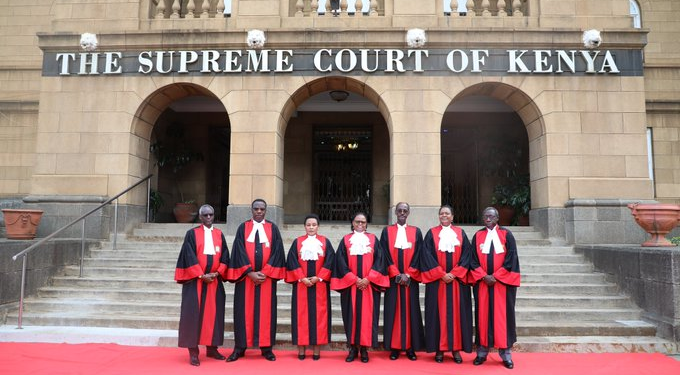

The Supreme
Court has granted a widow, initially represented by Senior Counsel Ahmednasir
Abdullahi in an inheritance case, 30 days to secure new legal representation.
Chief
Justice Martha Koome allowed Fatma Abud Faraj's request for an adjournment to
give her time to find a new lawyer after Ahmednasir was banned from appearing
before the court.
The court
had previously ordered Fatma to appear and state how she wished to proceed with
the case.
During a
virtual session, Fatma informed the judges that her former advocate, Asli
Osman, who is part of Ahmednasir’s firm, had notified her of today’s hearing.
"I'm
currently in the process of appointing another advocate. They have requested time to peruse the documents since they are bulky. I therefore request for
another hearing date. I will be filing a notice of change of advocate,"
said Fatma.
After
hearing from Fatma, Koome said she was "inclined to grant her time within
which to instruct another advocate. She is hereby given 30 days to look for
another counsel”.
The matter
she said will be listed for hearing by the registrar of the court.
The Supreme
Court has time and again stated that it will not hear any matters where the law
firm of Ahmednasir is appearing before it.
This they
said was because of his "continued unsubstantiated attacks to damage the reputation of the supreme judges".
The case
before court involves the estate of the late Mombasa tycoon Salim Juma Hakeen,
who died without a will on February 23, 2015, in Tanzania.
One of the
wives-Fatma- maintains that children born out of wedlock are not entitled to
benefit from the estate of their deceased’s father under Islamic Law.
She claims
to be the lawful wife to the deceased having been married through Islamic law
on August 4, 2006. They were blessed with four children.
She also
claims that one Faith Mwawasi was not a wife to the deceased and that her
"illegitimate children cannot inherit the estate of their father".
Mwawasi however
argues that she was married to the deceased in December 2011. They had four
children.
The deceased
according to court documents had ten properties in Diani and Mtwapa, cars and
several bank accounts.
In 2023, the court of appeal held that it's unfair and discriminatory for children born out of wedlock not to benefit from the estate of their deceased father.
Justices
Pauline Nyamweya, George Odunga and Gatembu Kairu declined to uphold an Islamic
law that provides that children born out of wedlock are not entitled to benefit
from the estate of their deceased father.
They said
any cultural practice that discriminates against children on the grounds of
their parent’s marital status must be abhorred.
"To
deny children born out of wedlock the benefit which accrues to other children
born in wedlock on the basis of the alleged “sins” committed by their parents,
in our view cannot be justified since it would mean that this Court would be
adopting “hurtful discrimination and stereotypical response” to a clear case of
discrimination," they said.












